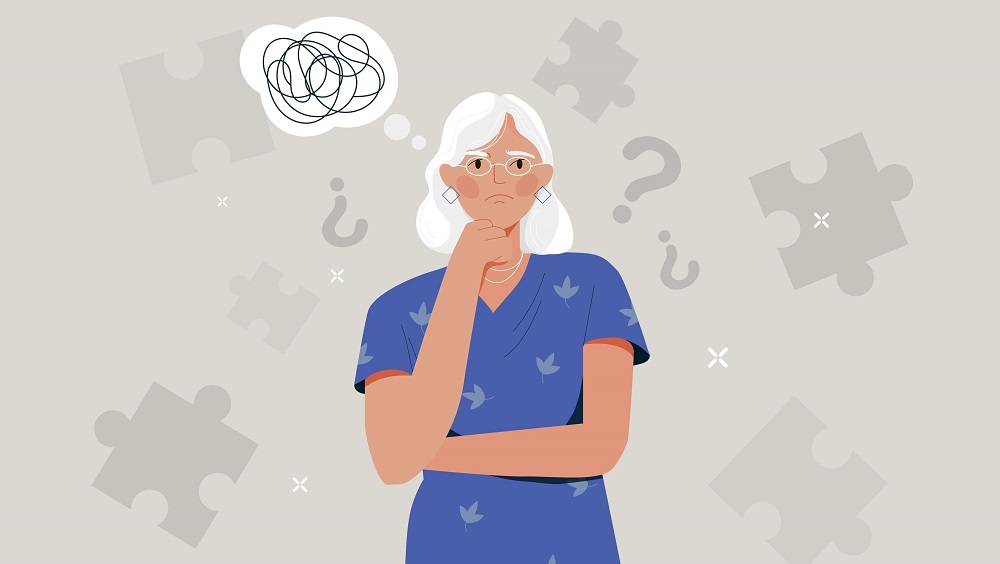
Is it Age-Related Cognitive Decline? A Guide to Symptoms, Causes and Treatment


Cognitive health — the ability to think clearly, learn, and remember — is essential in helping us live happy and fulfilling lives. Maintaining our cognitive health can become a challenge as we get older, and many people experience what is known as age-related cognitive decline. Like the physical changes that occur in our bodies (e.g., stiff joints, wrinkles, etc.), our brain also experiences age-related changes over time.
You may notice you’re struggling to pay attention, for example, or find you’re having trouble recalling conversations or people’s names. These experiences are a natural part of aging and manifest as a condition coined age-related cognitive decline.
Understanding Age-Related Cognitive Decline Symptoms
According to the Centers for Disease Control and Prevention (CDC), cognitive decline is a self-reported experience of “worsening or more frequent confusion or memory loss.” It’s considered one of the earliest symptoms of Alzheimer’s disease and other related dementias, although it’s important to know that these conditions aren’t inevitable.
While experiences may be different person-to-person and can vary daily in scope and severity, common age-related cognitive decline symptoms include the following areas:
- Memory: Forgetting names, dates, and places becomes more frequent. You may place items in odd locations, like putting the car keys in the refrigerator
- Language: Forming words, phrases, or sentences becomes increasingly more challenging.
- Thinking or judgment: You may lose track of time or your train of thought. Making decisions can become more difficult or overwhelming.
- Apathy: An often-overlooked symptom. You may suddenly lose interest in your favorite activities or give up when an activity feels difficult. This can signal a mental withdrawal during the decline process.
- Incessant rumination: People experiencing cognitive decline can feel chronic stress or get stuck in a fight-or-flight response.
If you are experiencing any of these symptoms, take the opportunity to have a conversation with an Aviv Clinics physician to assess their severity and discover how you may be able to improve your cognitive health.
Have you noticed changes in your memory, attention or thinking skills?
Download our free e-book, “What’s Happening to My Brain?” to learn how you can improve your brain health and cognitive vitality at any age.
The Causes of Age-Related Cognitive Decline
There are four main reasons age-related cognitive decline may occur:
- Hormonal fluctuations: As we age, it’s natural for hormonal imbalances to happen. Research indicates these changes can be a key factor in the decline of cognitive function.
- Stroke or head injuries: Head injuries or a stroke can damage blood vessels in the brain, which may incite cognitive impairment and even vascular dementia. Even a minor head injury sustained many years ago increases your chances of developing dementia.
- Psychiatric disorders: Disorders like depression and anxiety have been connected to cognitive and functional decline. They are commonly experienced by patients with mild cognitive impairment (MCI) and can either be a contributing factor or a symptom.
- Heart conditions: Research shows that those in their 40s to early 60s with high blood pressure have a higher risk of experiencing cognitive decline later in life. Lowering blood pressure decreases the risk for MCI.

Age-Related Cognitive Decline vs. Dementia and Alzheimer’s Disease
Approximately 12% to 18% of individuals over age 60 live with mild cognitive impairment. If left untreated, MCI can bring on various disorders related to more significant age-related cognitive decline.
Approximately 10% to 15% of people with MCI develop dementia every year. Dementia is an umbrella term that encompasses a variety of neurological conditions. These conditions negatively affect the brain. In essence, nerve cells stop functioning normally and eventually die, causing cognitive decline.
There are different types of dementia, such as:
- Alzheimer’s disease: Those with MCI are at greater risk of developing Alzheimer’s disease — the most common dementia diagnosis. In addition to cognitive decline, those with Alzheimer’s may experience shifts in behavior and personality. Read about the risk factors for Alzheimer’s disease.
- Frontotemporal dementia (FTD): FTD can occur when there is damage to the frontal and temporal lobes of the brain. Someone with FTD can show unusual behaviors, emotional problems, and difficulty communicating.
- Lewy body dementia (LBD): LBD is a condition caused by a buildup of Lewy bodies (a protein) in the brain. Common symptoms of LBD include movement issues (e.g., slowed movements, stiffness, tremors), cognitive issues, and mood shifts.
- Vascular dementia: A lack of blood flow to the brain can cause vascular dementia. People with this condition typically experience issues with reasoning, planning, judgment, and memory.
Are You At Risk of Developing Alzheimer’s Disease?
Learn how a simple blood test available at Aviv Clinics may be able to answer this question: pTau Testing
How to Slow Down Age-Related Cognitive Decline
Your brain is your superpower, but energy (in the form of oxygen and proper nutrition) is needed to make it perform like a superhero. If you give your brain energy, especially as you age, you can effectively slow down the aging process.
Aviv has developed a way to harness the power of oxygen using Nobel Prize-winning research. The Aviv Medical Program can incorporate a variety of therapies, including a specialized protocol of Hyperbaric Oxygen Therapy (HBOT). This protocol involves sending 100% pure oxygen to your deprived brain cells and body tissues, turbocharging your body’s own regenerative mechanisms through a phenomenon known as the hyperoxic-hypoxic paradox. In essence, this protocol deceives your body into believing it is deprived of oxygen, causing to to release healing factors to repair damage in your brain. Potential results include angiogenesis (new blood vessels), neurogenesis (new nerve and brain cells) and neuroplasticity (the brain’s capacity to rewire itself).
If you’re concerned about age-related cognitive decline, either in yourself or a loved one, contact Aviv Clinics in Florida today.
Last Update: August 8, 2025
Aviv Medical Program provides you with a unique opportunity to invest in your health while you age



